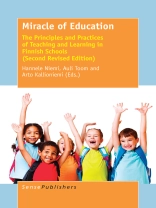‘Finnish pupils’ success in international student assessment tests and the characteristics of the Finnish educational system are the focus of interest all around in the world. The significance of Finnish educational policy and societal atmosphere are continuously discussed. This book provides explanations, answers and reflections to these questions. Over 30 expert authors have contributed to this book by bringing their own specific research-based points of view.
The second edition of the book introduces the new national curriculum for basic education that now provides guidelines for school-based curricula. Students’ learning with engagement and schools as learning communities are core visions of the reform. The authors also reflect on the PISA 2012 results. The book gives an example on how to use PISA information for national improvements. In Finland, all evaluations are enhancement-led and this also includes PISA measurements.
The book illustrates how teachingand learning of different subjects is realized in Finnish schools and describes the essential characteristics and methods of teaching, learning materials and research on these issues.
The book provides important insight and reflections to international researchers, teachers, students, journalists and policy makers, who are interested in teaching and learning in Finnish schools. It shows the results of the systematic and persistent work that has been done on education and schooling in Finland.
The main features of education in Finland are:
Strong equity policy.
Teachers as autonomous and reflective academic experts.
Flexible educational structures and local responsibility for curriculum development.
Evaluation for improvements, not for ranking.
No national testing, no inspectorate.
Research-based teacher education.
Teachers’ high competence in content knowledge and pedagogy.
Trust in education and teachers.’
قائمة المحتويات
Foreword: Perspectives for the Future of the Teaching Profession.- Preface to the Second Edition.- Acknowledgements.- Part I. Introduction: Current Educational Framing Factors and Conditions in Finland.- Finnish School in International Comparison.- The Societal Factors Contributing to Education and Schooling in Finland: The Finnish Education: Equity and Quality as Its Main Objectives.- Finnish Teachers as ‘Makers of the Many’: Balancing between Broad Pedagogical Freedom and Responsibility.- The Core of School Pedagogy: Finnish Teachers’ Views on the Educational Purposefulness of Their Teaching.- Part II. The Foundations: The Design of Educational System on Various Levels.- Striving for Educational Equity and Excellence: Evaluation and Assessment in Finnish Basic Education.- The Finnish National Core Curriculum: Design and Development.- Research-Orientation in a Teacher’s Work.- Part III. Teaching and Learning for Life: Academic Subjects.- Promoting Mathematical Thinking in Finnish Mathematics Education.- Science at Finnish Compulsory School.- Language and Literature Education: Principles and Reflections on Mother Tongue and Literature.- Language Education – Towards Transversal Intercultural Language Proficiency.- Religious Education in Finnish School System.- History, Social Studies and Geography Education in Finnish Schools and Teacher Education.- Arts Education: Instruments of Expression and Communication.- Part IV. Reflections: Future Scenarions and Investments for Pathways of Success.- Drama Education in the Finnish School System – Past, Present and Future.- ICTs in a School’s Everyday Life – Developing the Educational Use of ICTs in Finnish Schools of the Future.- Public Institutions as Learning Environments in Finland.- Luma Centre Finland: Joy of Science for All – Bringing Science, Math and Technology Together.- Epilogue: How to be Prepared to Face the Future?.- Biographical Notes.












